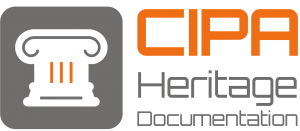APTI Workshop on Standardization: A Step Forward for Heritage Documentation
The Association for Preservation Technology International (APTI) recently held a workshop on standardization from June 11-14, 2024, in Ithaca, New York. APTI, a global organization dedicated to promoting the best practices for the preservation of historic structures, brought together experts from various disciplines to discuss the future of heritage documentation. The workshop, organized in collaboration with Cornell University, attracted 17 participants in person and three online, representing a range of fields including architecture, engineering, and conservation.
Representing CIPA Heritage Documentation, Prof. Em. Andreas Georgopoulos and Michelle Duong played key roles in the event. This marked the first instance where the recently signed Memorandum of Understanding (MoU) between APTI and ICOMOS (International Council on Monuments and Sites) was put into action. CIPA’s participation at the workshop was a significant milestone in its ongoing collaboration with APTI, with both organizations striving to align their objectives on heritage documentation.
Workshop Overview
The four-day workshop kicked off with two days of presentations, followed by two days of open discussions. The central theme was the standardization of documentation methods for historic structures, a critical component of preserving the built environment. Each participant was given the opportunity to present their views, contributing to a series of lively and diverse discussions. Topics ranged from documentation techniques to the roles that various stakeholders, including academic institutions, industry players, and funding agencies, can play in promoting standardization.
Georgopoulos presented an overview of CIPA-Heritage Documentation’s activities and introduced CIPA’s recently updated Recording Principles. He urged APTI to consider drawing from or adopting these principles, underscoring the importance of shared documentation standards. Michelle Duong introduced the activities of the CIPA Emerging Professionals (EP) group, further broadening the scope of the discussions.
Key Discussions and Outcomes
A central focus of the discussions was the role of standardization in heritage documentation. The participants explored the challenges of creating universal guidelines, acknowledging the complexities that arise due to regional variations and differing levels of technological adoption. While there was consensus on the need for clearer documentation standards, the group recognized that creating universally applicable guidelines would be difficult. One of the key challenges identified was the varying level of expertise among end users of documentation data, and participants agreed that more education and training are necessary to ensure proper use of available technologies.
The role of private companies in heritage documentation also emerged as a significant theme. While North American participants were more open to commercial involvement, European participants expressed concerns about allowing private entities to take on such responsibilities. This difference in perspective highlighted a broader geographic gap in approaches to heritage documentation, and participants emphasized the need for a more inclusive, international dialogue in future workshops.
Moving Forward
The workshop concluded with a consensus that this initiative must continue. Participants recommended expanding future workshops to include a more diverse range of stakeholders, including end users of documentation data and organizations such as APT’s Disaster Response Initiative (DRI) Task Group. G. Galer, Executive Director of APTI, will summarize the findings of the workshop and share them with participants in preparation for a follow-up meeting later in the year.
CIPA was encouraged to stay closely involved in these discussions and to use its international standing to promote the geographic broadening of such efforts. The lack of representation from regions such as Asia, Oceania, and Africa was noted, and participants agreed that future workshops should strive to include voices from these areas.
Social and Cultural Activities
In addition to the formal proceedings, participants were treated to a series of social and cultural activities organized by Cornell University. Guided tours of the campus and downtown Ithaca, along with group dinners, provided additional opportunities for networking and informal discussions, further strengthening the collaborative spirit of the event.
The APT-Cornell workshop proved to be a productive and insightful meeting, laying the groundwork for future collaboration between APT, CIPA, and other stakeholders in the field of heritage documentation. As the need for standardized practices grows, these organizations are set to play a crucial role in shaping the future of historic preservation.



